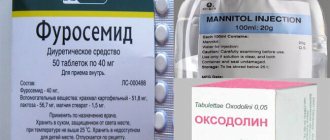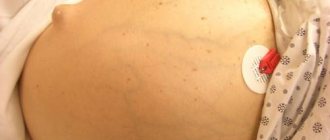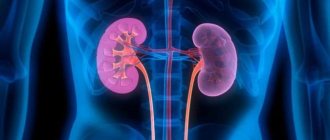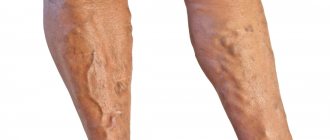Dehydration cannot be considered an independent disease; in most cases, it is the end result of some serious pathology. There is always a risk of such a problem, regardless of gender and age. Dehydration, or dehydration, is the loss of a significant amount of fluid by the body, which can lead to serious consequences in the future. As you know, the human body is seventy percent water. If it leaves the body, it is easy to guess that the process negatively affects health. As a result, there are malfunctions in the functioning of internal organs and the body as a whole. Metabolism suffers greatly, and the pathology develops very quickly. Therefore, it is necessary to know about effective ways to treat dehydration in order to prevent complications from arising.
Content:
- Pathogenesis
- Dehydration degree: first
- second
- third
- fourth
- isotonic
- headache
- mild form (at home)
Diagnostics
Initial dehydration is often already recognized as a typical symptom: thirst
. However, some people do not feel thirsty—especially older people. Feeling weak can also indicate a lack of fluid.
If severe dehydration is suspected, the doctor will carefully examine his patient to determine the extent and cause. The doctor looks for physical signs
.
Possible signs of dehydration
- Dry skin and mucous membranes,
- dark circles,
- Reduced skin tension (in case of exsiccosis, skin folds stop when it lifts),
- Consciousness of cloudiness, drowsiness, confusion,
- Headache and nausea,
- Cramps or
- Fever.
Symptoms of dehydration may vary,
and also depend on whether the body has lost mainly electrolytes, mainly water, or both.
Often the causes of fluid deficiency are directly apparent - for example, when it comes to the consequences of severe diarrhea or high fever. Sometimes, however, further physical examinations are necessary, for example when kidney failure is masked by dehydration.
Pathogenesis of dehydration
Dehydration begins when the body loses more water than it takes in (that is, a negative water balance occurs). Even a loss of 2-3% of fluid from total body weight leads to negative changes.
During dehydration, extracellular and intracellular fluid, sodium, chlorine, and potassium ions are lost. Losses occur not only through the skin, but also through the stomach, intestines, and kidneys. Even when breathing, a person secretes liquid (on average, we exhale 1 glass of water per day).
As a result of fluid deficiency, its redistribution occurs. Water from the extracellular sector enters the cell, which only increases dehydration and intracellular edema develops.
Causes
As you know, the human body consists of almost 90% liquid component. The normal functioning of cellular structures, organs and systems is impossible without water.
Dehydration is a pathological condition characterized by a negative water balance, that is, excessive loss of fluid with insufficient supply from the outside. Synonyms of this word are concepts such as dehydration, hypohydration, exicosis, hypohydria.
All causes of water deficiency are conventionally divided into external (exogenous) and internal (endogenous).
The first group includes:
- difficulty or inability to swallow (inflammation, injury, tumors),
- unconsciousness (coma),
- esophageal atresia,
- shortage of drinking water,
- improperly organized feeding and supplementation of infants,
- refusal to drink fluids during psychosis, hysteria.
The second group of reasons is more extensive and includes many pathological processes that contribute to the loss of fluid by cells and intercellular space.
These include:
- vomit,
- diarrhea syndrome due to infections, intestinal diseases, antibiotic therapy,
- massive bleeding
- increased sweating (overheating, weather conditions, endocrine pathology),
- extensive burns,
- fever,
- uterine bleeding,
- adrenal insufficiency,
- active use of diuretics,
- excessive salivation
- polyuria (excretion of large amounts of urine) with renal failure,
- severe shortness of breath.
Each of these causes or a combination of pathological conditions leads to dehydration of varying severity in an adult or child.
Dehydration levels
The more severe the degree of dehydration, the more severe the symptoms and negative changes in the body.
1st degree
With moderate dehydration, up to 3-4% of water from the total body weight is lost (about 1 liter).
The person begins to feel thirsty, weakness and slight malaise appear, appetite worsens, pulse quickens, and body temperature rises slightly. Against the background of gastrointestinal disorders (diarrhea, vomiting), the condition rapidly worsens.
2nd degree
The volume of lost fluid increases and reaches 5-6% of the total mass of a person (about 2 liters).
Such losses are already significant and have a negative impact on well-being. The following symptoms appear:
- prostration;
- decreased muscle activity, slower movements;
- thirst;
- dry mouth, lack of saliva;
- drying of mucous membranes;
- headache, dizziness;
- shortness of breath, rapid heartbeat;
- pallor, bluishness of the skin, dryness;
- tingling in the limbs.
At the second stage, the blood, due to water loss, becomes viscous, as a result of which the load on the heart increases and thermoregulation is disrupted.
3rd degree
In severe cases, fluid loss reaches 7-9%.
More and more dangerous symptoms appear, weakness, drowsiness, apathy, headache increase, blood pressure (BP) decreases, shortness of breath worsens, and muscle spasms appear.
4th degree
At degree 4, dehydration is already life threatening. Fluid loss exceeds 10% of total body weight.
Convulsions appear, the function of swallowing food is lost, hearing and vision deteriorate, blood pressure drops to critical levels, body temperature decreases, the skin wrinkles, and there is no urination. The person is in a delusional state.
| Signs | Dehydration degree | |||
| I degree | II degree | III degree | IV degree | |
| General state | satisfactory | relatively satisfactory | moderate severity | heavy |
| Estimated fluid deficit | 10-30 ml per kg of weight | 40-60 ml per kg of weight | 70-90 ml per kg of weight | 100-120 ml per kg of weight |
| Thirst | weak | moderate | significant | insatiable (or unable to drink) |
| Blueness of the skin | No | No | moderate (acrocyanosis) | pronounced (diffuse cyanosis) |
| Skin elasticity | fine | fine | reduced | sharply reduced |
| Convulsions | none | short-term in the calf muscles | long-lasting and painful, involving a large volume of muscles | persistent, generalized seizures |
| Pulse | fine | slightly accelerated | accelerated (tachycardia) | not detectable, filamentous |
| Eyeballs | fine | fine | sunken | very sunken |
| Oral mucosa | wet | slightly dry | dry | dry |
| Breath | fine | fine | dyspnea | deep, rapid |
| Volume of urination | fine | reduced | greatly reduced | no urination |
| Voice | fine | fine | weakened | absent (aphonia) |
| Volume of red cells in the blood | normal (40-50%) | 51-54% | 55-65% | 66% or more |
Main features
Symptoms of dehydration vary depending on the degree of dehydration. A mild degree is characterized by a loss of 5–6% of water, approximately 1–2 liters. With average, the body loses 2–4 liters of fluid. A severe, threatening form is a loss of 10% of weight (more than 4 liters).
With the isotonic type of dehydration, the blood salt level is normal. An increased concentration of salts is characteristic of the hypertensive form. Hypotonic dehydration of the body is characterized by a decrease in salt concentration. Signs of dehydration may vary slightly depending on the type of dehydration.
If you are thirsty, then the body is already experiencing a lack of water. But feeling thirsty is not the only indicator. A common clinical sign for all types is a loss of body weight of 5%, scanty excretion of concentrated urine, which has a dark yellow color. Symptoms of a lack of fluid in the body may be as follows:
- strong thirst;
- drying of the oral mucosa, viscous saliva;
- rare urination;
- feeling of dizziness, headaches;
- deterioration of health, weakness, fainting;
- dry and flabby skin;
- excitement, aggression, fear, hallucinations.
Dehydration is not characterized by one symptom, but manifests itself in a complex. If help is not provided, the disease progresses. From the gastrointestinal system, heartburn appears, constipation occurs, and colitis is observed. I am worried about headaches, joint and muscle pain. In severe advanced stages, fever, confusion, increased heart rate, and sunken eyes are possible.
For infants, a dangerous symptom is a sudden loss of body weight and lack of urine. Older children react to a lack of fluid in the body with an increase in temperature, dry mucous membranes (tongue, lips, eyeballs), and lack of tears. Parents are obliged to respond in a timely manner to the appearance of such signs and seek help from a doctor.
Classification of dehydration
There are 3 types of dehydration, each with its own characteristics and requiring an individual approach to treatment.
Isotonic
The most common type, which is characterized by the loss of potassium and sodium ions, both into the external environment and into the intracellular fluid.
Hypertensive
With this type of dehydration, fluid loss comes to the fore. The sodium ion concentration exceeds 145 mEq/L.
During treatment, it is important to prevent water loss, but this must be done slowly to prevent cerebral edema from developing. Osmotically active solutions of amino acids are used.
Hypotonic
It is accompanied by more pronounced symptoms than isotonic dehydration, since the volume of intercellular fluid sharply decreases. Develops mainly in children.
Causes of dehydration
- diarrhea, profuse vomiting, for example, in case of poisoning, colitis, enterocolitis, intestinal infection, including dysentery, cholera, salmonellosis, escherichiosis;
- high blood sugar, hypoglycemic coma;
- heavy blood loss;
- excessive physical activity, especially in hot weather, which leads to intense sweating;
- infectious diseases accompanied by high fever and increased urination;
- overheating, heat or sunstroke;
- burns with a large area of damage;
- taking diuretics;
- renal failure;
- violation of the drinking regime;
- alcohol abuse.
Dehydration and exicosis: causes
Dehydration or exicosis can have many causes
. Often, lack of fluid occurs when you drink too little. Old and/or caring people often do not feel thirsty and therefore do not realize that they need fluids. They are therefore particularly at risk of developing exsiccosis, which means that they excrete significantly more fluid than they absorb, so that dehydration is at risk.
But not only too low fluid intake, even organic diseases
, such as kidney disease, can cause dehydration and therefore lead to exsicosis.
At high temperatures, the body loses a lot of fluid.
When the body loses a lot of fluid, the likelihood of dehydration is high. This could be the case, for example
- Too hot,
- Heavy physical work with increased sweating,
- Vomit ,
- Diarrhea,
- Fever,
- Laxative abuse
- drainage medications (diuretics),
- large loss of blood, for example, during surgery or after an accident,
- with pathologically increased urine excretion, such as diabetes mellitus or diabetes insipidus, a disease associated with an increase in urine volume.
Symptoms of dehydration
Frequent headaches
Our body constantly uses fluids found in our body and consisting not only of water, but also of various minerals such as sodium and potassium. When dehydration occurs, hydration levels drop and chemical reactions occur in the blood, to which the brain is very sensitive. It reacts to these changes by causing headaches. The headache gets worse the more water you lose, because the more your blood volume decreases, the less oxygen gets to your brain. This causes dilation of blood vessels and headaches.
Constipation and digestive problems
Water helps food waste pass through your intestines and out of your body. If you don't drink enough water, your dehydrated body will have a hard time eliminating processed food effectively, which is likely to lead to constipation.
Dizziness
When dehydrated, blood volume decreases and, accordingly, blood pressure decreases. As a result, blood flow to the brain deteriorates and the person begins to feel dizzy, especially when standing. One of the key signs of dehydration is dizziness and blurred vision when you suddenly get up from a chair.
Feeling hungry often
A symptom that you need to drink more can also be a frequent feeling of hunger. If, after a good meal, you again feel the need for food (especially water-rich food, such as fruit) in a short time, then most likely this is a subtle hint of your dehydrated body. Try drinking a glass of pure water, preferably fortified with minerals.
Very yellow urea
An obvious sign of dehydration is deep yellow urine. This means that your urine contains excessive amounts of waste products. Water helps get rid of them effectively. When you are fully hydrated, your urea will have a higher water to waste ratio, giving it a lighter color. Remember: light-colored urine is a good sign that you are drinking enough water, but only if you do not have kidney problems!
Increased sleepiness
If you feel tired and can't cheer yourself up, it's time to drink water! As we have already found out, dehydration affects the level of blood in the body, reduces blood pressure and oxygen content in it. Lack of oxygen slows muscle and nerve function, making you drowsy and tired. On the other hand, when you are hydrated, water enters the bloodstream from the body's cells to help maintain the right amount of blood to regulate blood pressure.
Increased body temperature
The human body requires water to regulate temperature through sweat. Sweat is produced when we overheat and lowers body temperature through evaporative cooling. Because sweat is mostly water, if you're dehydrated you won't be able to sweat enough to cool your body.
Dry mouth
An obvious indicator that your body is in desperate need of hydration is a dry mouth and a slightly swollen tongue. Our oral cavity in its natural state should be moist, so if it becomes dry, then this is a clear sign of dehydration and you need to quickly drink a bottle of water!
Muscle cramps
Adequate levels of hydration and electrolyte balance in the body are necessary for proper muscle contraction. When you're dehydrated, your electrolyte balance is off, your sodium and potassium stores are low, and you're more likely to get nasty muscle cramps. When dehydrated, an individual muscle or even a group of muscles may involuntarily contract or go into spasm. Hydration will help you prevent cramps and spasms.
Skin loses firmness and elasticity
To maintain youthful skin and prevent sagging, it is especially important to drink the required amount of water throughout the day. A simple test to determine whether you are dehydrated or not is to pinch your skin. If the skin instantly returns to its original position, then everything is in order. Otherwise, your body is likely dehydrated and needs hydration!
What signs indicate dehydration?
What is it about? What are the symptoms of dehydration?
Despite the need to drink enough water per day, most people limit themselves to only a couple of glasses.
Lack of fluid intake is manifested by the following symptoms:
- Darkening of the urine is observed.
The urine of healthy people has a light yellow, amber tint. When dehydrated it darkens. When there is a lack of fluid in the urine, the content of so-called waste (dead blood cells, toxins and other substances that must be removed in the urine) increases, so it changes color to a darker one.
Darkening of urine is also possible as a result of taking medications, an excess of vitamins belonging to group B in the body, drinking beetroot juice, blueberries and food colorings. If you didn't eat anything the day before that could make your urine darker, you may not be drinking enough fluids and your body is signaling a problem.
Photo: Depositphotos
Start drinking more. If the problem persists, seek medical advice. Dark urine can be observed with hepatitis or with stones formed in the gall bladder.
- There is a decreased frequency of urination throughout the day.
Normally, a person is supposed to go to the toilet “little by little” about 6-7 times a day. Not drinking enough means that less fluid is removed from the body to be replaced. In this way, the kidneys retain fluid to prevent dehydration.
If you go to the toilet less than 6 times a day, start drinking more so that your body can function in a normal healthy way.
- Constipation occurs.
Insufficient fluid intake is one of the main causes of constipation. When the body suffers from dehydration, it begins to withdraw water from organs, including the rectum. Lack of fluid affects the quality of stool. The less it is in the body, the harder the stool, the harder it is to pass.
To avoid this problem, you should drink more water and more fiber, which is abundant in vegetables and fruits.
Photo: Depositphotos
Other causes of constipation include lack of physical activity and illness. We are talking about hypothyroidism, intestinal inflammation, dysbacteriosis. Even stress can cause constipation. If you drink a lot of fluids and still have problems with constipation, you should consult a doctor to determine the cause.
- Dry skin and pronounced wrinkles are observed.
Many ladies, in an effort to preserve beauty and youth, tend to pamper their skin with expensive moisturizing creams that help fight age-related changes. However, this is not enough. It is necessary to provide the body with the necessary amount of fluid by drinking plenty of fluids.
It is poor drinking that leads to dehydration, which is manifested by dry skin, irritation, peeling, inflammation and even itching. Because of this, wrinkles are defined more clearly and become more visible. Not drinking enough water leads to premature aging.
- You feel hungry and gain weight.
It is inherent in our body to manifest a lack of moisture in the body by increasing the feeling of hunger. When we feel thirsty, we often want to eat at the same time. However, eating instead of the glass of water your body requires causes an increase in calorie intake. The consequence of this is excess weight gain.
Swelling and excess weight may be a consequence of not drinking enough Photo: Depositphotos
Those who care about maintaining a slim figure should remember the need to drink plenty of fluids. Thanks to it, the feeling of hunger decreases and we eat less. It is enough to drink water a quarter of an hour before meals so as not to overeat later.
- There is a feeling of thirst and dryness in the mouth.
If you're thirsty, you're already feeling dehydrated. Especially if thirst is accompanied by dry mouth. This means that the mucous membranes of the body need moisture. Drink more to avoid these sensations.
- A headache appears
Dehydration causes loss of moisture in the brain tissue, which activates pain receptors and we begin to feel a headache. In addition, a lack of water in the blood leads to a worse supply of oxygen to the brain. The blood vessels of the brain have no choice but to expand, and the headache intensifies even more.
- There is a feeling of fatigue.
Scientists have proven that dehydration causes us to feel tired, weak, and have decreased performance. From a lack of moisture, there is less blood in the body, it supplies the organs with oxygen and nutrients less well, hence the feeling of fatigue.
Fatigue and headache can be a sign of dehydration Photo: Depositphotos
If you are tired, drink a glass of water. This will give you strength and vitality.
- Joint pain appears.
Water is a kind of lubricant for joints. When dehydration occurs, damage to cartilage tissue occurs due to a deficiency of its nutrition. The result is pain. Drink more to prevent this from happening to you.
- The body's defenses are weakened.
Due to dehydration, the amount of toxins in the blood increases, weakening the immune system. The body needs water to effectively fight infections. Drink more to strengthen the body's defenses and resist various diseases.
Drink water! Photo: Depositphotos
To avoid problems caused by dehydration, do not forget to stay hydrated.
A person who does not have serious health problems needs to drink the amount of water at the rate of 30 ml per 1 kg of weight. In other cases, everything is individual, after consultation with a doctor.
Remember that soda, tea and coffee, and juices cannot replace water. Once you start drinking as much water as your body needs for normal functioning, it won’t take long for your body to improve.
Tags: dehydration, health status, drinking water
How to recognize and prevent dehydration in children
Dehydration in children is most often caused by diarrhea or vomiting. In newborns, dehydration can be caused by hyperthermia or insufficient fluid intake, for example, during artificial feeding.
The condition of children deteriorates faster than that of adults, since their body weight is less, and, accordingly, the volume of fluid is also less.
The main signs of dehydration in a child:
- lethargy, drowsiness;
- flabby, dry skin, decreased turgor;
- lack of saliva in the mouth, tears while crying;
- dry and pale lips;
- dyspnea;
- sunken eyes;
- reduction in the urge to urinate;
- darkening of urine.
As soon as these signs appear, it is necessary to restore the water balance.
To prevent dehydration in children, it is recommended to adhere to the following recommendations:
- in case of diarrhea, vomiting, give the child rehydration solutions in small portions;
- for acute respiratory viral infections and other diseases that are accompanied by high temperature, provide plenty of fluids, give both plain water and liquid containing glucose;
- ensure that the child does not overheat in the sun;
- Ensure a balanced drinking regimen; give bottle-fed babies, in addition to formula, water to drink.
Possible consequences and complications of dehydration
Humans are 80% water. A sudden loss of 10% of fluid leads to negative consequences, more than 20% - to death. Dehydration poses the greatest danger to newborns, children and the elderly.
Untimely treatment of dehydration can lead to irreversible changes in the body.
The most likely consequences are:
- violation of digestion, absorption of nutrients;
- tissue hypoxia, which leads to damage to the central nervous system;
- oliguria (decreased urine output);
- nutrient deficiency, which causes health problems and decreased immunity;
- decrease in circulating blood volume, increase in its viscosity;
- decrease in blood pressure;
- premature aging.
With severe degrees of dehydration, the functioning of the kidneys is impaired, renal failure can develop, convulsions appear, and death is possible.
Treatment of dehydration
Dehydration is accompanied by severe thirst, but excessive fluid intake can be harmful instead of beneficial.
The intake of large amounts of fluid against the background of dehydration can lead to cell rupture due to their overfilling, kidney dysfunction, brain swelling and even death.
Treatment must be timely and correct. Restoring lost fluids is done using rehydration solutions containing electrolytes rather than plain water.
Treatment of mild forms of dehydration
In mild cases of dehydration (stages 1 and 2), fluid loss can be restored at home.
What can you drink if you are in the early stages of dehydration?
- saline solutions, for example, “Regidron” or “Ionica”;
- mineral still waters containing electrolytes;
- ordinary boiled water, dried fruit compote with added sugar (glucose solutions are not used for diarrhea).
You need to drink the liquid in a couple of sips. For vomiting or diarrhea, saline solutions are taken every 5 minutes, 5-10 ml. Treatment is continued even after symptoms have subsided for 2-3 days.
Along with proper drinking regimen, it is important to follow a diet. Eliminate from your diet foods that have a diuretic and laxative effect (melon, watermelon, cucumbers, peaches, beets, tomatoes, dairy products). Try not to eat heavy foods.
Give preference to first courses cooked in vegetable or second meat broth, steamed cutlets, and rice porridge. Don't force yourself to eat.
Treatment of severe dehydration
Dehydration of 3-4 degrees is treated in the hospital. Do not self-medicate!
Be sure to consult a doctor if:
- diarrhea or vomiting does not stop within two days (a day for children);
- body temperature has risen above 39 °C;
- severe lethargy, loss of strength, dizziness appeared;
- noticed scanty or no urination for 12 hours;
- blood pressure below 100/60 mm.
Treatment is often carried out by a therapist/pediatrician or an infectious disease specialist.
The patient is given intravenous glucose, saline and electrolytic solutions. Blood pressure and pulse are regularly measured, and kidney function is monitored using a urine test.
In addition to dehydration, the underlying cause that caused it is treated.
On hot summer days, especially when a person spends a long time under the scorching sun, in addition to the risk of sunstroke, heatstroke, sunburn and other unpleasant conditions of the body, dehydration can also occur.
In today's article we will talk about dehydration: signs, causes and ways to prevent dehydration, because... correct actions in certain situations can save more than one human life. So…
Dehydration (dehydration) is a pathological condition of the body caused by a decrease in the amount of water in it below the physiological norm necessary for the normal functioning of all human organs.
The human body consists on average of 60% water. Digestion is based on water, water lubricates the joints, helps remove waste products, and is required for breathing, because the lungs need constant hydration in order to saturate the blood with oxygen and free it from excess carbon dioxide.
A person can survive without water from 3 to 10 days, which depends on the ambient air temperature, physical activity and psychological state of the person.
Dehydration is deadly in both hot and cold weather.
A sudden loss of a large amount of fluid by the body, or its presence in small quantities, sharply increases the feeling of thirst, but if you start drinking water immoderately, this can lead to sudden swelling and even death.
Dehydration is very dangerous for children, the elderly, and especially for newborn babies. Monitor symptoms closely, and as soon as this group of people develops an illness that causes fever, nausea, or diarrhea, contact your doctor immediately!
Types and degrees of dehydration
Dehydration levels:
- mild dehydration (loss of 5-6% or 1-2 liters of water); - average (loss of 6-10% or 2-4 l); - severe (loss of 10% or more than 4 liters); - acute (loss of more than 10 liters of water) - this degree of dehydration is life-threatening.
Types of dehydration:
— isotonic (the salt composition of the blood is normal); - hypertensive (increased concentration of blood salts); - hypotonic (reduced concentration of blood salts).
Causes of dehydration
- diarrhea and vomiting (for example, caused by food poisoning); - increased sweating (may be associated with hot weather, increased physical activity or intense training); - sunstroke or heatstroke; - frequent urination; - drinking large amounts of alcohol (headache in the morning is a sign of dehydration); - burns.
Symptoms of dehydration
Important! A loss of 20-25% of water is fatal.
The first signs of dehydration:
- dry mouth and viscous saliva; - dark urine with a pungent odor, rarely and in small quantities; - weakness, apathy, irritation; - increased body temperature; - nausea, vomiting; - diarrhea.
Symptoms of dehydration (from mild to severe in increasing order):
- strong thirst;
- general malaise; - slowing down movements; - lack of appetite; - redness of the skin; - drowsiness; - the appearance of dark circles under the eyes;
- increased heart rate; - increase in body temperature; - nausea, vomiting; - gastrointestinal disorders; - dizziness; - headache; - shortness of breath; - tingling in the limbs; - decrease in blood volume and increase in its viscosity; - lack of salivation and dry eyes; - cyanosis; - unintelligible speech; - loss of ability to move; - nonsense; - muscle spasms; - swelling of the tongue; - inability to swallow; - dullness of hearing and vision; - involuntary urination; - cooling the body.
Complications of dehydration
- kidney damage; - shock (pallor, rapid breathing, cold sweat, clammy skin, rapid pulse, weak pulse, loss of consciousness); - dehydration can be fatal, especially in infectious diseases and in the weakened.
Consequences of dehydration
If dehydration of the body is not prevented in time in the initial stages and the condition is allowed to progress, this leads to a decrease in the volume of intracellular fluid, which in turn leads to the onset of irreversible processes.
The consequences of dehydration can manifest themselves as:
— disruption of food processing and transportation of vital substances; - increased blood pressure; - weakening of the immune system, and as a result, the development of various diseases; - premature aging.
Treatment of dehydration
Treatment of dehydration is the rapid restoration of the body's water balance.
With severe dehydration, there is so little fluid that blood circulation is disrupted, and all vital organs for the body’s functioning begin to “starve.” Treatment of severe dehydration is carried out only in a hospital setting, so be sure to call an ambulance if you have symptoms.
Treatment for moderate to severe cases includes intravenous fluids and hospital care.
Treatment of mild and moderate forms of dehydration is focused on restoring the lost volume of fluid and blood and in most cases, depending on the accompanying symptoms, is allowed at home.
Treatment of mild to moderate dehydration
1. Provide the victim complete rest. Place the patient on a flat surface and, if possible, place him in a cool, damp area with good air circulation.
2. Give the victim plenty of fluids. For this it is recommended to use:
- ordinary water; — drinks containing carbohydrate/electrolyte/sodium/potassium (mineral waters); — frozen juices and ice shavings; - drinks containing glucose.
You need to drink liquid slowly and in small portions. You can use a straw for this.
3. To accelerate the restoration of lost intracellular and intercellular fluid, as well as restore the water-salt balance of the body, you can give the patient special (rehydration) medications: “Rehydron”, “Gastrolit”, “Orasan”.
Homemade rehydration solution, recipe: 1 teaspoon sugar, 1 glass orange juice and ¾ teaspoon salt. Drink in small sips 3 times a day.
3. If dehydration occurs as a result of overheating, it is necessary to direct efforts to normalize body temperature, for this:
- place the person in a well-ventilated and cool room, if possible, point a fan at him; - remove all excess clothing from the patient, loosen the rest; - Apply a cool wet cloth to the forehead, and if possible, wrap the whole person with a similar cloth, or let him take a shower; - periodically the person can be sprayed with cool water;
When taking actions aimed at normalizing body temperature, be careful not to overcool the person, otherwise the blood vessels will narrow and restoration of health will be delayed; in addition, hypothermia can cause other diseases.
See a doctor immediately if:
1. Dehydration has occurred in an infant, a child under 10 years of age, or an elderly person;
2. Dehydration is observed in severe or acute forms:
- diarrhea for more than 2 days; - severe headaches and dizziness, loss of consciousness; - severe nausea and vomiting for 12 hours; - no urination for 12 hours; — the temperature has risen above 39°C; - lethargy and difficulty breathing are observed; - severe abdominal pain; - epileptic seizures, etc.
Preventing dehydration
Dehydration is much easier to prevent than to treat.
To prevent dehydration:
- drink at least 2-3 liters of clean water (not including other drinks) throughout the day, regardless of the weather and your level of activity; - drink plenty of fluids, especially if you have a fever, nausea or diarrhea; — active children on a walk on a hot day need to drink at least 150 g of water every 30 minutes; - adults in hot weather during physical activity need to drink at least 1 liter of water per hour; — make it a habit to always have a bottle of regular water with you and drink it throughout the day.
Source: https://medicina.dobro-est.com/
Read also:
- Recommendations for travelers
- What to take to the sea? The most necessary things
- Safety in the heat. Sunburn
- Safety in the heat. Tips for all occasions
- Reminder on maintaining health for those traveling on tourist trips
- Sunburn. Symptoms, prevention, treatment
- Avoiding the heat at work
- Summer cold. How not to get sick
- August in Crimea will start with heat
- Acclimatization on vacation: how to behave so that your vacation is not overshadowed by unexpected surprises
- Storm warning of abnormally hot weather and extreme fire danger for June 24-30
- Ministry of Emergency Situations of Crimea. A restriction on visiting the forest has been introduced
- WHO. Safe food guide for tourists
- Tips for sun exposure in hot weather
- Recommendations for nutrition and drinking regime in hot weather
- Sunburn
- Prevention of acute intestinal infections
Basics of life safety
Water safety.
It is important to know The sun, air and water, when used correctly, are a source of hardening and strengthening of health...
Recommendations for the population on behavior in conditions of high smoke...
In case of increased smoke content in the atmospheric air caused by forest fires, in order to prevent…
Tick-borne infections. REMINDER
Currently, tick-borne infections (namely, infections transmitted by ixodid ticks) represent...
OBZD. Fire in the forest. What to do?
Warm weather conditions will be conducive to outdoor recreation. Unfortunately, people often forget about the...
Recommendations for maintaining health during tourist trips
When traveling to foreign countries, especially with a hot and unusual climate, all tourists...
Safety in the heat. Tips for all occasions...
How to escape from the scorching sun and stuffiness - read our useful material. Air conditioners –…
Storm wind
Wind is the horizontal movement of air flow parallel to the earth's surface, resulting...
About recommendations on how to celebrate the New Year without harm...
The days of the winter holidays will be filled with only positive emotions if you follow these simple rules...
The carrier’s liability for causing harm to a passenger’s health…
A memo has been published on the official website of Rospotrebnadzor, which explains issues of responsibility...
Poisoning by mushrooms and poisonous plants
Mushrooms are representatives of a special living Kingdom that have nothing in common with plants. Their su...
Fire in the country: from causes to rules...
A fire in a country house is, to put it mildly, an extremely undesirable situation. And yet, from time to time, dachas...
RECOMMENDATIONS FOR CITIZENS: How to collect and cook mushrooms?
Every year in the Russian Federation, about 1 thousand victims of mushroom poisoning are registered, ...
Safety in the heat. Sunburn
In today's post we will share with you information about first aid for sunburn. Information to…
Providing first aid for a snake bite
Poisonous snake bites pose a danger to human life and health. Despite the fact that these pr…
Sudden building collapse. Memo to the population
The collapse of a building, complete or partial, refers to emergency situations that result in...
How to protect yourself from winter injuries?
At this time of year, bruises and bone fractures (about 15%), and dislocations (about 10) predominate. Main reasons...
Car stuck on winter road
Hypothetically, this situation could happen to every motorist. Don't panic etc...
Ministry of Internal Affairs warns about financial scammers
In recent years, fraud using mobile communications and...
Snake bites: prevention, first aid, treatment
Poisoning by snake venom is studied by such a branch of medicine as clinical toxicology, and to master the in...
Be careful with mushrooms
Recently, cases of mushroom poisoning have become more frequent. Most poisonings are caused by the use of...
On the purchase of children's goods through cross-border online trading
Rules for the circulation on the market of products for children released into circulation on the territory of states - h...
Ice: Safety Rules
With the onset of winter, street injuries more than doubled seasonally. I agree...
Utility services remind you of safety rules for New Year...
The New Year and the long weekend that follows are a long-awaited event. Someone, of course, will leave to celebrate...
Rules for safe handling of pyrotechnics
Any pyrotechnic product has the potential to cause fire or injury. That's why…
Rules for organized transportation of children by various modes of transport
In the Republic of Crimea and the city of Sevastopol, preparations continue for mass New Year’s events…
OBZD. Car crashes. Prevention
Road transport is the most dangerous transport. It accounts for the lion's share of transport...
Automobile accidents. What you need to know
About 75% of all accidents in road transport occur due to drivers violating road rules...
OBZD. Annoying insects
High humidity, the rainy season, which visited us before the onset of persistent hot weather, geographical...
Rescue on the waters. How to protect yourself while riding in...
A survival school instructor talks about those water safety rules that most people ignore...
Safety at a picnic
How to avoid getting sunburned, how to protect yourself from poisoning, how to protect yourself from ticks, how to be safe...
Preventing dehydration
Dehydration can be easily prevented if you follow simple recommendations:
- drink at least 1-1.5 liters of fluid per 30 kg of your weight daily (i.e. if you weigh 60 kg, then drink 2-3 liters of fluid every day). It is important not to overdo it, because... a large volume of incoming fluid creates a load on the kidneys;
- for vomiting and diarrhea, take rehydration solutions;
- when walking outside in hot weather, drink water: adults - 1 liter per hour, children - at least 150 ml every half hour;
- do not forget about drinking plenty of fluids during febrility;
- Take diuretics only under medical supervision;
- do not abuse alcohol, especially in the heat.
Information sources:
- https://kerchbolnica1.ru/index.php/shkola-zdorovya/profilaktika-zabolevaemosti/930-obezvozhivanie-organizma-prichiny-simptomy-profilaktika-i-lechenie
- https://www.who.int/elena/titles/bbc/dehydration_sam/ru/
- Dorland. Dorland's illustrated medical dictionary. Philadelphia, WB Saunders, 2007.
- New formulation of oral rehydration salts (ORS) with reduced osmolarity. The United Nations Children's Fund Supply Division, 2004 (Technical Bulletin, No. 9).
- Golden MHN. Severe malnutrition. In: Weatherall DJ, Ledingham JGG, Warell DA eds. The Oxford textbook of medicine. Oxford, Oxford University Press, 1996:1278–1296.











